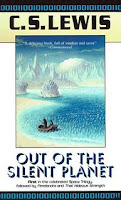 On September 23, 1938, Out of the Silent Planet by C.S. Lewis was first published. Before it was published, two publishers rejected it. One reader report from a publishing house read, "Mr. Lewis is quite likely, I dare say, to write a worth while novel one day. This one isn't good enough - quite," later referring to characters in the book as "bunk." Ouch.
On September 23, 1938, Out of the Silent Planet by C.S. Lewis was first published. Before it was published, two publishers rejected it. One reader report from a publishing house read, "Mr. Lewis is quite likely, I dare say, to write a worth while novel one day. This one isn't good enough - quite," later referring to characters in the book as "bunk." Ouch.Tolkien championed the book, somewhat, in a letter to a publisher, but still said, "Lewis is always apt to have rather creaking stiff-jointed passages."
Lewis and Tolkien had made a bargain to write books with Christianity as their underlying themes. Tolkien was supposed to write a time travel story, while Lewis would write a space travel tale. Incidentally, Tolkien's story was also rejected by a publisher and was not published until 1987 in The Lost Road and Other Writings ("The Lost Road" was the story).
But Lewis persevered and wrote Out of the Silent Planet in 1937 and it was published in 1938. It did not sell well until after Lewis had commercial success with The Screwtape Letters (1942) and was not even published in the U.S. until 1943.
Lewis was bothered by science fiction of his day being mostly anti-Christian, promoting materialistic worldviews and the exploitation of other worlds. Admittedly influenced by the likes of H.G. Wells and Jules Verne, which he read in his childhood, Lewis wanted to write his own space story that would include as its underlying theme a "spiritual adventure" with Christianity at its center, though not overtly.
Indeed, of the many reviews the book received, Lewis later wrote that only two of them seemed to pick up on the Christian theme he had included in the book! A reviewer for The Times Literary Supplement said, "it lacks too much of Mr. Wells's special gift of dramatic sharpening ..."
It is not my favorite in the trilogy, sometimes referred to as the "space trilogy" or "Ransom trilogy." The second book in the series, Perelandra, is set on Venus and was published in 1943, while the final volume, That Hideous Strength came out in 1945 (abridged as The Tortured Planet, 1946).
It is the third volume that is my favorite. I don't know whether it is my favorite because I have read it the most or if I have read it the most because it is my favorite. I've enjoyed That Hideous Strength for its parallels to ideas Lewis communicated first in The Abolition of Man, a timeless and prescient book with many applications to contemporary ethics matters, particularly in relation to bioethics and genetic engineering.
But, getting back to Out of the Silent Planet, Lewis wrote about the book in a letter, "I like the whole interplanetary idea as a mythology and simply wished to conquer for my own (Christian) pt. of view what has always hitherto been used by the opposite side." In another letter Lewis wrote that interplanetary fiction can be created "for spiritual adventures. Only they can satisfy the craving which sends our imaginations off the earth."
At any rate, one thing Lewis wanted to accomplish as a Christian writer was not so much any sort of overt Christianity - much of which we have today in "Christian fiction" - but books where the Christian worldview was "latent," as he explained in his essay, "Christian Apologetics" (1945) in God in the Dock: "What we want is not more little books about Christianity, but more little books by Christians on other subjects - with their Christianity latent."
I don't know that I agree with the Christianity being "latent," as in not fully developed or manifested (hidden, if you will), but I do think Christians need to be producing top quality literature in their respective fields, one of which would include fiction, that would also be infused with reasonable faith grounded in biblical truth.
Is this happening? I think the mentality within publishing, and within the minds of too many Christian writers, is still the idea that there is a dichotomy between "fiction" and "Christian fiction." There should not be.
Are we too concerned with marketing and sales to comprehend such matters?






No comments:
Post a Comment